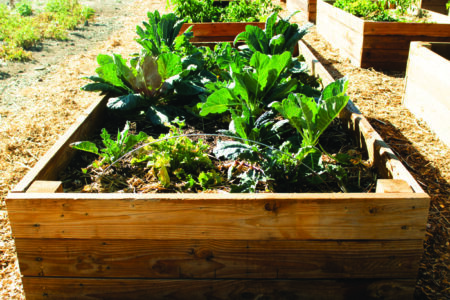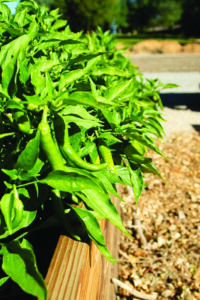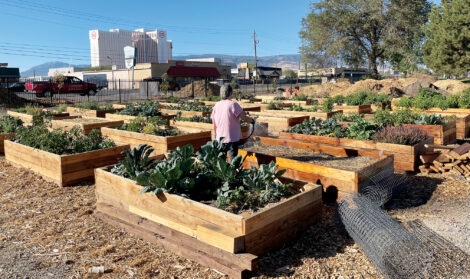NThis Northern Nevada urban garden and nonprofit provides solutions for food insecurity, education, community, and more. Learn more about its initiatives in Reno, Nevada to serve and support those who need it.
In 2017, Earstin Whitten and his wife, Dee, took note of a neglected community garden on the hospital campus of Saint Mary’s Health Network in Reno, Nevada. They approached the hospital administrators and began restoring the health of the land shortly thereafter. Thus, Soulful Seeds was born. By 2018, Earstin and Dee had recruited a board of directors, developed a produce-distribution network to serve two of the highest-need census tracts (defined geographic regions used in census-taking) in the county, and built a network of community volunteers to help maintain the garden. Quickly, the two learned of a large plot of land the county wanted to use to support the residents of the Our Place Campus, a facility that provides transitional housing to unhoused women, their children, and pet companions. It took two years to work through the layers of government before Soulful Seeds could secure a sublease to manage the land, but it was successful, and the grassroots project has been developing ever since.
Today, supported by eight board members, one staff member, and more than 250 community volunteers, Soulful Seeds is thriving and growing on the Our Place Campus. I recently had the opportunity to speak with Brooke O’Byrne, executive director of Soulful Seeds, to learn more. Here’s what she had to share.
About the Northern Nevada Urban Garden and Mission
Britney: What was the mission of Soulful Seeds when it began, and how has that evolved or stayed the same over the years?
Brooke: From the start, we’ve provided healthy, sustainable, fresh food for our most vulnerable community members. Soulful Seeds was founded on the belief that food distribution won’t resolve food insecurity. We’ve carried out our mission with a vision of sustainability. Knowing that food security is tied to income and that healthy food access is connected to where you live, we’ve built our gardens in the middle of communities with the greatest needs and designed our programs to address multiple dynamics of food insecurity. We teach people to grow food and preserve and prepare the harvest, we provide basic health and wellness education, and we use our gardens to offer workforce-development opportunities that expand employment skills.

The most exciting evolution of our mission is the development of our garden on the Our Place Campus, because we can host all of these services in a hyper-local setting. Most families residing on campus can see the 3-acre garden from their back door, which is really exciting, because this view transforms their living environment. In addition to the obvious benefits of producing food, the garden plays a role in improving physical and mental well-being, offers access to a safe outdoor space, and provides an inclusive environment for people from across the greater community to work together in the garden as peers.
I understand that your latest garden project is still a work in progress. What will the Our Place Campus garden look like when it’s complete?
It’ll be a busy place. We have 3 urban acres to work with. When everything is finished, we’ll have 32 raised garden beds, six wheelchair-accessible beds, a 1-acre crop field, three large hoop houses, an orchard, an apiary, and a small training facility where we’ll host cooking and nutrition classes.
We anticipate completing construction by the end of 2024, and when it’s finished, the garden will host daily activities for the 350-plus neighbors on campus.
What more can you share with me about the Our Place Campus and the community it serves?
The Our Place Campus is truly one of a kind. Washoe County designed the housing-first campus to address the housing crisis in northern Nevada. The campus is managed by the county and operated by several independent agencies representing shelter services, mental health, substance-use-disorder treatment, child care, medical assistance, case management, and now gardening. Each agency works within its area of expertise to ensure families have shelter and all the wraparound supports to help them get back on their feet.
Many Our Place Campus residents belong to groups traditionally marginalized by mainstream society. Of the 2021 residents who received services from the campus, 59% had a physical or cognitive disability, 91% had a behavioral health disorder, 29% belonged to a minority racial or ethnic population, and 28% were chronically homeless.

What I really like to highlight for people is that, yes, developing a garden on campus provides immediate food access and supports the nutritional needs of residents. But what’s more significant is that many of these people are on some sort of healing journey. Whether it’s for a behavioral health diagnosis or recovering from the trauma of being unhoused and needing to ask for assistance, everybody is on a journey, and the garden becomes this neutral space where they can connect with the community in a different and healing way.
When you think about people who are moving through housing shelters or maybe have one of the diagnoses mentioned previously, they’re usually marginalized in the community. When they come into the garden, they’re working alongside other community volunteers, Master Gardeners, people from the university, etc. They work alongside them peer-to-peer. It becomes a safe space for people to reconnect with the community and be included outdoors, which is something you don’t often see made available for these populations.
Helping Provide Solutions for Food Insecurity to Reno, Nevada and Beyond
Can you tell me about your volunteers and the roles they play in the success of Soulful Seeds?
Our volunteers play a critical role — they make everything happen. In 2022, we had over 250 volunteers working in the garden or on one of our committees. Volunteers come from the Our Place Campus and from a next-door residential treatment facility called CrossRoads. We also cast a broader net and invite people from the general community. In each of these settings, volunteering is truly voluntary. Nobody is told to come and work; it’s solely their choice. Most of our volunteers don’t have a set schedule, but they all come regularly once or twice a month.

I share these numbers to show that virtually everything we do is generated by volunteers. Our gardens are overseen by a garden manager, which is important, because many community gardens fail because of being unmanaged. But aside from that, we really don’t have staff. Everything that happens here, from weeding to watering to even a lot of the construction, is volunteer work.
Once the garden is complete, our volunteers will have more assigned responsibilities — as in, someone will be responsible for certain aspects of watering or weeding or maintaining certain sections of the garden. But for now, everyone pitches in where it’s needed.
Can you tell me more about your programs?
We offer three types of programs: food access, education, and workforce development.
Our food-access program is designed to serve Our Place residents. We distribute overflow to pantry partners. On days we harvest produce, we immediately distribute it. We don’t store anything; it goes directly to the campus, and any surplus will go to one of two community pantries with limited access to fresh produce. These pantries serve two of the lowest-income census tracts and prioritize services to homebound seniors and veterans.

Our education programs focus on gardening education, food preparation and preservation, and wellness. One of the neatest features of these education programs is that we center them around the current needs and circumstances of the neighbors in the community. A good example comes from back in 2020, when we were hosting a cooking class and learned that many of the participants were living in places, such as motels, where they didn’t have access to a kitchen. We prioritize providing everyone with the resources they need to do the cooking that we’re teaching. So, that year, we gave away 150 Instant Pots and provided education around using them so people had the means to cook their fresh produce with nothing more than an outlet.
Our workforce-development programming is currently less structured. We’re focusing on teaching and practicing soft skills (such as time management, teamwork, and problem-solving) in the garden setting. After construction, we’ll shift gears to add more structured workforce-development opportunities linked to garden products that’ll contribute to the sustainability of our nonprofit operations.

Most excitingly, this year, we’ll begin developing a community advisory committee that’s providing a neighborhood voice to program development. The committee consists of neighbors and residents who inform us of what they’d like to grow and what kinds of education they’d like to receive. That way, it’s not us stepping into their neighborhood and telling them what they need — it’s neighbors shaping their garden and education space to represent their own unique cultures and histories.
Where can readers find and support Soulful Seeds?
We’re most active on our website (Soulful Seeds Nevada) and social media (@SoulfulSeedsNV). We also welcome email contact (Hello@Soulful-Seeds.com) and respond to all the outreach we receive personally. We’re happy to speak with anyone who’s interested in replicating what we’re doing or getting involved in any way. We’re always looking for corporate sponsors and accept donations via our website’s donation portal.
Britney Bowman is a writer, artist, and pollinator advocate in Black Mountain, North Carolina. She’s passionate about empowering women, queer individuals, and other minorities in STEM fields. You can follow her journey on Instagram (@Mrs.Bs.Bees).
Originally published as “Soulful Seeds: More Than a Garden” in the June/July 2023 issue of MOTHER EARTH NEWS and regularly vetted for accuracy.




